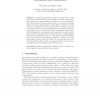Free Online Productivity Tools
i2Speak
i2Symbol
i2OCR
iTex2Img
iWeb2Print
iWeb2Shot
i2Type
iPdf2Split
iPdf2Merge
i2Bopomofo
i2Arabic
i2Style
i2Image
i2PDF
iLatex2Rtf
Sci2ools
107
click to vote
EUROCRYPT
2004
Springer
2004
Springer
Practical Large-Scale Distributed Key Generation
Generating a distributed key, where a constant fraction of the players can reconstruct the key, is an essential component of many largescale distributed computing tasks such as fully peer-to-peer computation and voting schemes. Previous solutions relied on a dedicated broadcast channel and had at least quadratic cost per player to handle a constant fraction of adversaries, which is not practical for extremely large sets of participants. We present a new distributed key generation algorithm, sparse matrix DKG, for discrete-log based cryptosystems that requires only polylogarithmic communication and computation per player and no global broadcast. This algorithm has nearly the same optimal threshold as previous ones, allowing up to 1 2 − adversaries, but is probabilistic and has an arbitrarily small failure probability. In addition, this algorithm admits a rigorous proof of security. We also introduce the notion of matrix evaluated DKG, which encompasses both the new sparse matrix algor...
Related Content
| Added | 01 Jul 2010 |
| Updated | 01 Jul 2010 |
| Type | Conference |
| Year | 2004 |
| Where | EUROCRYPT |
| Authors | John F. Canny, Stephen Sorkin |
Comments (0)

